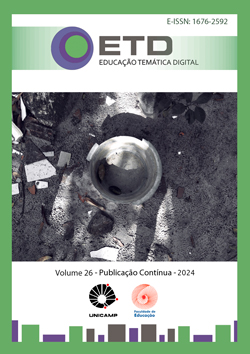Abstract
This article presents an analysis of the production scientific-academic on Artificial Intelligence (AI) in the field of education. The research approach is based on qualitative and exploratory studies, and carried out through a bibliographic review through the database of journals of the Coordenação de Aperfeiçoamento de Pessoal de Nível Superior (CAPES). It is guided by questioning the possibilities of using AI as a sociocultural artifice of academic education and emancipation, in addition to investigating the methodological-theoretical contributions such productions bring to the educational field. Based on a critical theoretical framework, we sought inventorying the studies and understand how knowledge field is configured and the relationship owns it’s with education in global society.
References
BARBOSA, Wilmar do Valle. Tempos pós-modernos. In: LYOTARD, Jean-François. A condição pós-moderna. Rio de Janeiro: José Olympio, 2009.
BARRETO, Raquel Goulart. Tecnologia e educação: trabalho e formação docente. Educação & Sociedade, Campinas, v. 25, n. 89, p. 1181-1201, 2004. Disponível em: https://www.scielo.br/j/es/a/6HmDSHGqC5VC3RSNtYWZmWS/abstract/?lang=pt . Acesso em: 15 jun. 2020.
BARROSO, João. O Estado, a educação e a regulação das políticas. Educação & Sociedade, Campinas, v. 25, n 89, p. 1105-1126, 2005. Disponível em: http://www.scielo.br/pdf/es/v26n92/v26n92a02.pdf Acesso em: 7 jun. 2020.
BERNHEIM, Carlos Tünnerman; CHAUÍ, Marilena Souza. Desafios da universidade na sociedade do conhecimento: cinco anos depois da conferência mundial sobre educação superior. Brasília, DF: Unesco, 2008.
BRASIL. Ministério da Ciência, Tecnologia e Inovações. Gabinete do Ministro. Portaria GM nº 4.617, de 6 de abril de 2021. Institui a Estratégia Brasileira de Inteligência Artificial e seus eixos temáticos. Diário Oficial [da] República Federativa do Brasil, Poder Executivo, Brasília, DF, 12 abr. 2021.
CAMPOS, Luis Fernando Altenfelder de Arruda; LASTÓRIA, Luiz Antônio Calmon Nabuco. Semiformação e inteligência artificial no ensino. Pro-Posições, Campinas, v. 31, e20180105, 2020. Disponível em: http://old.scielo.br/scielo.php?script=sci_arttext&pid=S0103-73072020000100500&lng=es&nrm=iso . Acesso em: 7 jul. 2020.
CARDIN, Valéria; WOLOWSKI, Matheus Ribeiro Oliveira. Implicações jurídicas do uso da inteligência artificial no processo educacional: pode a máquina substituir um professor humano. Revista Jurídica, Curitiba, v. 1, n. 63, p. 198-220, 2021.
DOMENICI, Thiago. Faculdades da Laureate substituem professores por robôs sem que alunos saibam. Folha de São Paulo, São Paulo, 2 maio 2020. Disponível em: https://www1.folha.uol.com.br/educacao/2020/05/faculdades-da-laureate-substituem-professores-por-robo-sem-que-alunos-saibam.shtml . Acesso em: 2 mar. 2022.
DOMINGOS, Pedro. O algoritmo mestre: como a busca pelo algoritmo de machine learning definitivo recriará nosso mundo. São Paulo: Novatec, 2017.
FAPESP. Publicações científicas sobre inteligência artificial. Revista FAPESP, São Paulo. Disponível em: https://revistapesquisa.fapesp.br/publicacoes-cientificas-sobre-inteligencia-artificial1/ Acesso em: 20 abr. 2021.
FRIGOTTO, Gaudêncio. O ataque à educação pública e à democracia pelas contrarreformas e o fundamentalismo aula magna proferida no curso de Pedagogia - Niterói, da Faculdade de Educação da Universidade Federal Fluminense, em agosto de 2019. RevistAleph, Niterói, n. 33, p. 13-32, 2019. Disponível em: https://periodicos.uff.br/revistaleph/article/view/40172/23142 . Acesso em: 20 abr. 2021.
HARVEY, David. The condition of postmodernity: an enquiry into the origins of cultural change. Cambridge, MA: Blackwell, 1992.
LIBÂNEO, José Carlos; OLIVEIRA, João Ferreira de; TOSCHI, Mirza Seabra. Educação escolar: políticas, estrutura e organização. 10. ed. São Paulo: Cortez, 2012.
LYOTARD, Jean-François. A condição pós-moderna. Rio de Janeiro: José Olympio, 2009.
PACHECO, José Augusto; SOUSA, Joana; MAIA, Ila Beatriz. Conhecimento e aprendizagem na educação superior: desafios curriculares e pedagógicos no século XXI. Revista Diálogo Educacional, Curitiba, v. 20, n. 65, p. 528-575, 2020. Disponível em: https://periodicos.pucpr.br/index.php/dialogoeducacional/article/view/26460 . Acesso em: 18 jan. 2021.
PASSONE, Eric Ferdinando Kanai. Psicanálise e educação: o discurso capitalista no campo educacional. ETD [online], v.15, n.3, p.407-424. Disponível em: http://educa.fcc.org.br/scielo.php?pid=S1676-25922013000300002&script=sci_abstract . Acesso em: 11 mai. 2023.

This work is licensed under a Creative Commons Attribution-NonCommercial-NoDerivatives 4.0 International License.
Copyright (c) 2024 ETD - Educação Temática Digital


